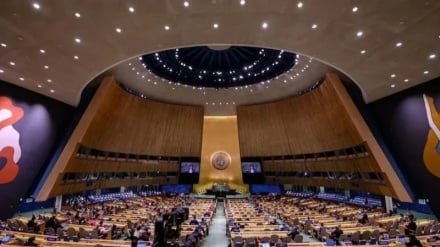UN warns of further displacement from Sudan despite ceasefire
The United Nations has warned that the ongoing clashes in Sudan would trigger “further displacement” of people, who risk dangerous roads to flee the violence and seek refuge in neighboring South Sudan, Egypt and Chad.
The UN Refugee Agency (UNHCR) warned on Tuesday that more people are expected to leave the country for Chad and South Sudan, as they are facing acute shortages of food, water, medicines and fuel in the capital Khartoum.
“The fighting looks set to trigger further displacement both within and outside the country,” UNHCR Spokeswoman Olga Sarrado said Tuesday.
Since the outbreak of the fighting in mid-April, at least 20,000 Sudanese have fled into Chad and some 4,000 South Sudanese refugees — who had been living in Sudan — have returned to their home country, according to Sarrado, warning that the figures could rise.
More than 800,000 South Sudanese refugees live in Sudan, a quarter of them in Khartoum, where they are directly affected by the fighting.
Overall, Sudan hosts 1.1 million refugees, according to the UNHCR.
In neighboring Egypt, state media has claimed that more than 3,000 people have crossed into Egypt since the fighting began. Authorities, however, have not confirmed the number of people who have already entered the country.
UNHCR has so far 58,995 Sudanese refugees registered in Egypt.
Meanwhile, reports say Egypt's border control is asking for visas for some men trying to enter the country from Sudan.
“Officially, the Egyptian authorities have not announced any information on who can enter without a visa, who cannot and how to obtain that document; nor have they announced or clarified the measures to apply for asylum at the border crossings, nor what the procedures are," said Nour Khalil, the Director of Refugees Platform in Egypt.
"Women, children, and men under 16 and over 50 can cross without a visa,” he added.
In the meantime, the UN humanitarian office, OCHA, warned that supply shortages around Khartoum were worsening and prices for basic goods were skyrocketing.
“After 10 days of fighting, shortages of food, water, medicines and fuel are becoming extremely acute, especially in Khartoum and surrounding areas,” according to OCHA.
It also cited reports that the cost of basic goods had surged, saying prices for bottled water had doubled, and said cash was scarce and hard to access.
A report cited "reports of rapidly rising transport costs, making it increasingly difficult for people to leave conflict-affected areas. Cash is scarce and hard to access," it said.
Sudan warring sides, the army and paramilitary Rapid Support Forces (RSF) agreed to US mediated 72-hour ceasefire on Monday. But sounds of heavy artillery and gunfire are still reported in Khartoum’s twin city of Omdurman.
ME



